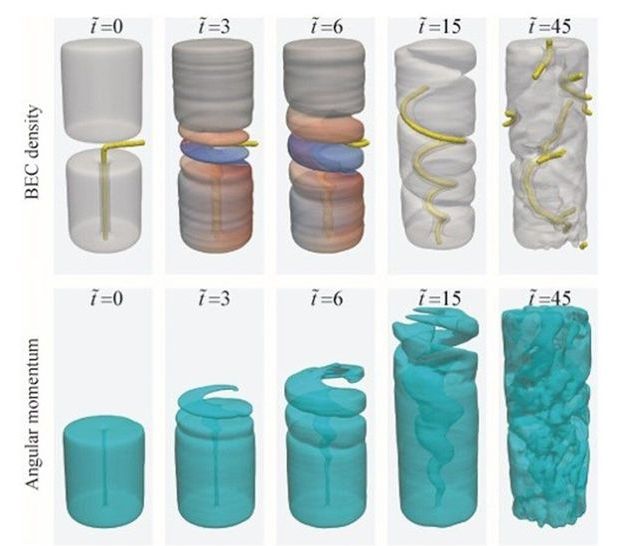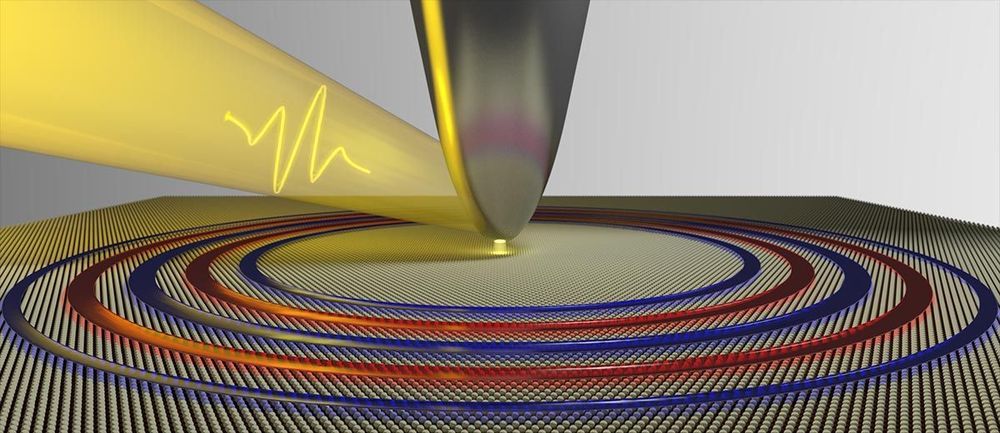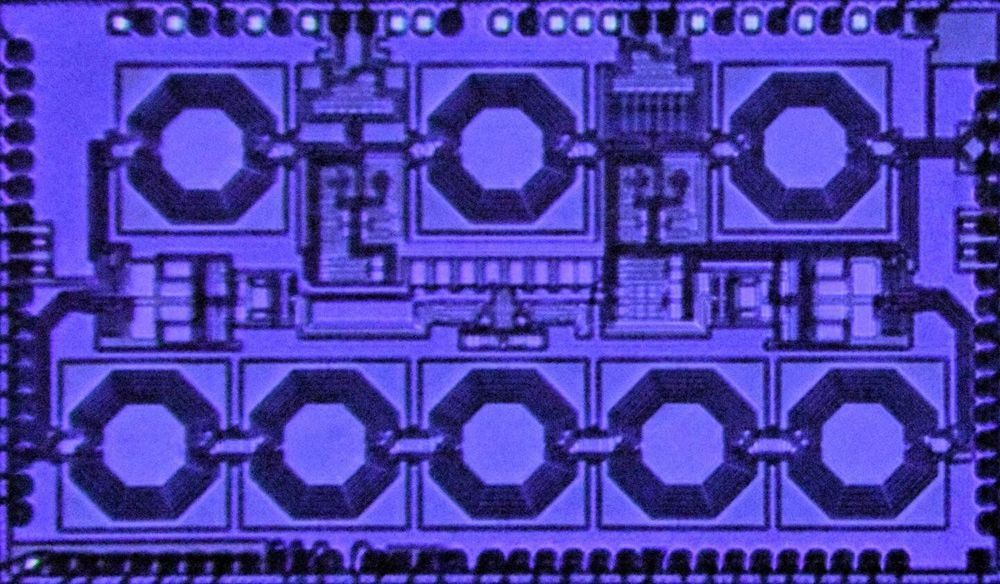If a drop of creamer falls from a spoon into a swirling cup of coffee, the whirlpool drags the drop into rotation. But what would happen if the coffee had no friction—no way to pull the drop into a synchronized spin?




Quantum engineers from UNSW Sydney have created artificial atoms in silicon chips that offer improved stability for quantum computing, according to a news release.
In a paper published today in Nature Communications, UNSW quantum computing researchers describe how they created artificial atoms in a silicon ‘quantum dot’, a tiny space in a quantum circuit where electrons are used as qubits (or quantum bits), the basic units of quantum information.
Scientia Professor Andrew Dzurak explains that unlike a real atom, an artificial atom has no nucleus, but it still has shells of electrons whizzing around the centre of the device, rather than around the atom’s nucleus.

An international team of scientists uncovered exotic quantum properties hidden in magnetite, the oldest magnetic material known to mankind. The study reveals the existence of low-energy waves that indicate the important role of electronic interactions with the crystal lattice. This is another step to fully understand the metal-insulator phase transition mechanism in magnetite, and in particular to learn about the dynamical properties and critical behavior of this material in the vicinity of the transition temperature.
Magnetite (FeO4) is a common mineral, whose strong magnetic properties were already known in ancient Greece. Initially, it was used mainly in compasses, and later in many other devices, such as data recording tools. It is also widely applied to catalytic processes. Even animals benefit from the properties of magnetite in detecting magnetic fields – for example, birds are known to use it in navigation.
Physicists are also very interested in magnetite because around a temperature of 125 K it shows an exotic phase transition, named after the Dutch chemist Verwey. This Verwey transition was also the first phase metal-to-insulator transformation observed historically. During this extremely complex process, the electrical conductivity changes by as much as two orders of magnitude and a rearrangement of the crystal structure takes place. Verwey proposed a transformation mechanism based on the location of electrons on iron ions, which leads to the appearance of a periodic spatial distribution of Fe2+ and Fe3+ charges at low temperatures.



Study co-led by Berkeley Lab reveals how wavelike plasmons could power up a new class of sensing and photochemical technologies at the nanoscale.
Wavelike, collective oscillations of electrons known as “plasmons” are very important for determining the optical and electronic properties of metals.
In atomically thin 2D materials, plasmons have an energy that is more useful for applications, including sensors and communication devices, than plasmons found in bulk metals. But determining how long plasmons live and whether their energy and other properties can be controlled at the nanoscale (billionths of a meter) has eluded many.

Waves, whether they are light waves, sound waves, or any other kind, travel in the same manner in forward and reverse directions—this is known as the principle of reciprocity. If we could route waves in one direction only—breaking reciprocity—we could transform a number of applications important in our daily lives. Breaking reciprocity would allow us to build novel “one-way” components such as circulators and isolators that enable two-way communication, which could double the data capacity of today’s wireless networks. These components are essential to quantum computers, where one wants to read a qubit without disturbing it. They are also critical to radar systems, whether in self-driving cars or those used by the military.
A team led by Harish Krishnaswamy, professor of electrical engineering, is the first to build a high-performance non-reciprocal device on a compact chip with a performance 25 times better than previous work. Power handling is one of the most important metrics for these circulators and Krishnaswamy’s new chip can handle several watts of power, enough for cellphone transmitters that put out a watt or so of power. The new chip was the leading performer in a DARPA SPAR (Signal Processing at RF) program to miniaturize these devices and improve performance metrics. Krishnaswamy’s group was the only one to integrate these non-reciprocal devices on a compact chip and also demonstrate performance metrics that were orders of magnitude superior to prior work. The study was presented in a paper at the IEEE International Solid-State Circuits Conference in February 2020, and published May 4, 2020, in Nature Electronics.
“For these circulators to be used in practical applications, they need to be able to handle watts of power without breaking a sweat,” says Krishnaswamy, whose research focuses on developing integrated electronic technologies for new high-frequency wireless applications. “Our earlier work performed at a rate 25 times lower than this new one—our 2017 device was an exciting scientific curiosity but it was not ready for prime time. Now we’ve figured out how to build these one-way devices in a compact chip, thus enabling them to become small, low cost, and widespread. This will transform all kinds of electronic applications, from VR headsets to 5G cellular networks to quantum computers.”
https://facebook.com/LongevityFB https://instagram.com/longevityyy https://twitter.com/Longevityyyyy https://linkedin.com/company/longevityy
- Please also subscribe and hit the notification bell and click “all” on these YouTube channels:
https://youtube.com/Transhumania
https://youtube.com/BrentNally
https://youtube.com/EternalLifeFan
https://youtube.com/MaxEternalLife
https://youtube.com/LifespanIO
https://youtube.com/LifeXTenShow
https://youtube.com/BitcoinComOfficialChannel
https://youtube.com/RogerVer
https://youtube.com/RichardHeart
https://youtube.com/sciVive
Church of Perpetual Life: https://www.youtube.com/COPL18
SHOW NOTES TIME STAMPS:
0:00 Sneak Peak & Longevity Team Intro
2:08 Bill Faloon Intro: https://lifeextension.com & https://age-reversal.net
3:00 Life extension inspiration
3:35 Challenge death norm, …” I am not going to let that happen…”
4:39 Safety in life extension medication
4:58 Metformin Safety
6:58 “FDA is an incompetent and corrupt federal bureaucracy”
8:35 Berberine alternative for Metformin?
10:20 Metformin role in AMPK enzyme
11:30 AMPK activation in intermittent fasting?
12:00 Bill Faloon personal experience with Metformin
14:30 “…Take Care of yourself today…” by getting annual blood tests to test for lipids, glucose, etc.
15:05 Optimized sleep strategies
17:27 Insomnia
18:20 Blue light exposure graphic
18:50 Watch Brent’s interview with The Sleep Doctor, Micael Brues: https://youtube.com/watch?v=7af2AAjL4b4&t=662s
20:13 Removing anxiety strategies for better sleep
22:04 Human age reversal project clinical trial update
24:50 Exosomes — Watch Brent’s interview with Kimera Labs exosomes CEO/founder Dr. Duncan Ross: https://youtube.com/watch?v=X8eIxo3eqvQ&t=10s
26:30 IF NOTHING ELSE KILLS US, AGING WILL
27:15 Subscribe to The Church of Perpetual Life YouTube channel: https://www.youtube.com/COPL18
28:45 TAME trial for Metformin https://ncbi.nlm.nih.gov/pmc/articles/PMC5943638
29:58 Dr. Nir Barzilai
33:01 Metformin not illegal for doctors to prescribe
34:01 Intermittent fasting benefits
34:46 autophagy
35:59 Is coffee bad for telomeres?
37:01 All types of coffee containing roasted beans contain some acrylamide
37:28 Chlorophyllin to guard against acrylamide
37:55 Watch Brent’s interview with Bill Faloon https://youtube.com/watch?v=sKjHJE8x1bs
38:08 History and future of The Church Of Perpetual Life
40:20 Dr. Aubrey de Grey connected Bill Faloon with Neal Francis Vanderee to start The Church of Perpetual Life! Watch Brent’s interview with Aubrey https://youtube.com/watch?v=TquJyz7tGfk&t=365s
42:10 Religion and afterlife argument for life extension & immortality
43:35 Bill says Dr. George Church feels all viruses may just disappear in next 3–4 years and aging may be vanquished in next 10 years
44:10 Quantum Archeology “…Quantum computer technology that will ultimately be our road to physical immortality. “
45:23 Nikolai Fyodorov’s view of how “Mankind was created to find a way to achieve abundant immortality”
46:52 Why do you want to live forever?
49:01 Do the impossible!
51:00 How can all of us contribute to this life extension movement?
52:28 Why religion, immortality and living a long life are already connected
55:02 Simulation theory
55:45 Rate of how fast technology is improving
58:51 Diet food recommendations
1:00:03 Dr. Eric Berg YouTube: What Really Happens When We Fast? https://youtube.com/watch?v=vhmtoAYVRSo
1:01:42 Death anxiety
1:05:20 Bill Faloon’s influence on his kids and their work
1:09:01 Longevity benefits of having kids
1:09:48 fetal stem cells
1:11:13 Clinical trial update & where to get tested
1:13:34 Bill Faloon’s most important advice
1:15:30 Figure out your chronotype https://thepowerofwhenquiz.com
1:16:18 Brain health tips: Lithium, blueberries, CoQ10 (Ubiquinol)
1:18:55 Conclusion

NASA has conducted an experiment in Antarctica, which has revealed new evidence that a parallel universe exists, except the rules of physics, are the opposite of ours.
Physicists have been debating among one another since 1952 of the possibility of a multiverse, whereby many universes exist parallel to ours. These universes could have different laws of physics, or even be similar to ours — just with different timelines.
The original theory was proposed by Quantum science pioneer Erwin Schrodinger, and even he admitted that he might have seemed a little crazy when he hosted that lecture. But now a new discovery has pushed scientists to reconsider if his theory is really as far-fetched as they thought it was. A cosmic ray detection experiment in Antarctica found a particle that very well may be from another universe.